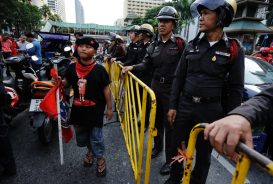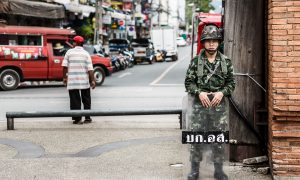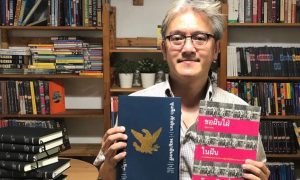On 16 August 2020, a crowd of about 200 people gathered at the Ubon Ratchathani City Pillar Shrine to support a youth-led, anti-government mass protest in Bangkok aiming to oust the junta-leader-turned-prime-minister Prayuth Chan-o-cha. A banner was erected featuring writings by demonstrators expressing their demands and frustrations. Messages ranged from complaints about the lack of freedom of expression in Thailand to praise for republicanism. A booth was set up to gather signatures in support of a petition for a new constitution. But the main highlight was political speeches. In the speaker lineup were Ubon locals young and old, veteran and novice, rich and poor.
Among these speakers were familiar faces of Ubon Ratchathani who have been engaged in political activism since 2009. It has been ten years since a violent military dispersal against the Redshirt movement claimed their friends’ lives and destroyed countless families of those killed and jailed. It has been six years since the coup that facilitated the stifling suppression of their political activities. It has been one year since the pro-democracy parties they supported, including Pheu Thai and Move Forward (formerly Future Forward), were deprived of their well-deserved political powers despite doing well in the 2019 general election. The Redshirts today still have much to hold a grudge about.
The protest also took place against a pandemic being exploited by the Prayuth government as grounds for expanding its powers and punishing political mobilisation. That former Redshirts continued to gather in support of anti-government protests is a reflection of the depths of their grievances and yearnings for justice. In this article, I examine the protest at the City Pillar Shrine to exemplify the endurance of the Redshirts against all odds and their involvement in the 2020 youth-led protests in Thailand that broke the historical limits of political expression in many ways. Despite the pandemic, many protesters from the Redshirt movement have found a new lease on their political lives. Other provinces in Isan have also seen support for the youth-led movement by Redshirts who nevertheless are not compromising their identity—they continue to don their bright red outfits and openly carry their Redshirt paraphernalia without being afraid of being stigmatised. Even those previously jailed have joined some of the rallies I have observed.
Politics amid the pandemic
Ubon Ratchathani has always been an important political arena for both street and electoral politics. Resistance in the province has endured both historically heavy repression and, more recently, efforts by the government to stifle political activity amid the pandemic.
As usual, there was a heavy police presence both in plain clothes and in uniform. Notorious military-directed Internal Security Operations Command (ISOC) agents were mingled with the protesters, keeping a watchful eye and ear. The heavy security presence was typical of the Northeastern (Isan) province where a city hall building was torched in 2010 and 21 anti-government Redshirt protesters jailed as a result. A protester from the province was also among those killed in the deadly May 2010 military crackdown. Another committed suicide upon receiving a summons by the 2014 coup makers.
Despite this history, at least 20 anti-government demonstrations were held in 2020, even amid the government’s stringent COVID-19 measures that deterred public gatherings. On 13 January 2020, Thai authorities announced the first case of COVID-19 in Thailand after an individual arriving from Wuhan, China tested positive. The news came only a day after mass anti-government activities had taken place in various parts of Thailand under the theme Wing Lai Lung (Run to Oust the Uncle). The “Uncle” was no other than Prayuth who has been in his post since the 2014 military coup. As I have commented elsewhere, the fun-run/protest hybrids garnered strong support from a range of socioeconomic backgrounds including newer generations. News reports of these activities made big headlines in mainstream media.
But such political excitement was short-lived when the fearsome pandemic finally made its way to the country. The media quickly redirected its focus to news related to COVID-19. For almost a month, news coverage of shortages of face masks, hand sanitiser and disinfectants dominated. As more cases were reported, social media turned into a ground for witch-hunts against those suspected of being infected. Expressions of political frustrations were left in the background.
An exceptional period followed the day the Constitutional Court disbanded the up-and-coming Future Forward Party on 21 February 2020 on the dubious grounds of accepting a loan from its party leader Thanathorn Juangroongruangkit. All of a sudden, fierce protests led by university students erupted in various provinces. That the COVID-19 scare could not suppress the protesters’ drive to take to the streets is a testament to the depth of their grievances.
However, legal measures that the government claimed were necessary to stop the spread of the disease, including an Emergency Decree barring public gatherings, were effective in quietening political resistance for a few months. Nights were quiet; days were slow. Small, petty street vendors in Ubon Ratchathani that I talked to in April complained that they were barely staying afloat. Even shops in the ever-popular Central shopping mall were closed. Perhaps it was such economic problems that pressured the government to gradually ease its harsh measures.
Towards the end of June, public gatherings became allowable. Political activities resumed quickly, suggesting that all this time political frustrations had never faded but were eagerly awaiting a time to resurface.
From redshirts to youth protesters: passing the baton
Aged and ageing, seasoned Redshirt protesters returned to participate in a series of historical street protests that started in mid 2020 and continued until the end of the year. This time they scaled down their role to supporters of the protests, which have been led by youth leaders from different political groups who have dared to vocalise unprecedented demands for reforming the monarchy alongside calls for a return to democracy. Redshirts joined these protests out of their own wills as individuals with the urge to continue the struggle for democracy despite the lack of leadership from their core leading organisation, the United Front for Democracy Against Dictatorship (UDD).
When invited to give a speech at the City Pillar Shrine protest, with tears in his eyes and referring to himself as khun ta [grandfather], a Redshirt in his late 60s, said, “Today khun ta is very happy. If you luk lan [children and grandchildren] feel something when seeing things happening in our country, if you felt anything when hearing the verdict of the Redbull case and wanted to grind your teeth with anger, that’s how the Redshirts felt. If you saw the case of the invasion of a 1700-rai forest that ended with no arrests of anyone and then trembled with anger, that also was how we Redshirts felt…”
In this speech, a bond was created that bridged the new round of street protests and that of the Redshirts from years ago. The speaker’s use of the kinship term khun ta signified a warm, familial relationship between him, a much older Redshirt, and youth protesters who were generations younger. His references to high-profile legal cases underscored the Redshirts’ key grievance—lack of justice—while juxtaposing the Redshirts and youth groups in the same context of struggle, highlighting their shared sentiments. The Redshirts’ signature heart clappers rattled in the background as he continued his 15-minute speech that commanded the attention of the audience.
Towards the end of his speech, he stated, “In fact, being a Redshirt is something we carry in our hearts. We love equality, love democracy—one right, one voice. Please treat us equally as all Thais. Treat us the same as others…So, let me ask you luk lan, please do not [sobbing] let the struggle of the Redshirts go to waste. Please rise up in large numbers. On behalf of the Redshirts—all of them wherever they are—I thank you our luk lan for seeing our worth. We are proud to have been honored at the rally at Chulalongkorn University. They paid us respects there. We appreciate the fact that our struggle hasn’t been for nothing. Let us leave the future of Thailand in you—our luk lan’s hands. We as people who have fought before will stand behind you.” Here by thanking the youths and trusting the future of the country with them, the Redshirt speaker declared that the leadership of the movement for democracy belongs to younger generations and relegated the Redshirts’ role to that of supporters.
Is the era of “Red versus Yellow” over in Thailand?
ยุคของ “แดง ปะทะ เหลือง” ในประเทศไทยจบแล้วจริงหรือ?
The COVID-plagued 2020 could not stop people from protesting. However, more potent threats to the pro-democracy movement have reared their heads in the first few months of 2021. Several protest leaders have been charged and detained without bail. Political enthusiasts have been distracted from street politics by local, provincial elections. This is not to mention signs of in-fighting among protest leaders. With so many challenges ahead, it will be interesting to see if the Redshirts continue their support for the youth-led democratic movement, and how the elite establishment will react if large-scale mass protests take place once again.
 Facebook
Facebook  Twitter
Twitter  Soundcloud
Soundcloud  Youtube
Youtube  Rss
Rss 



